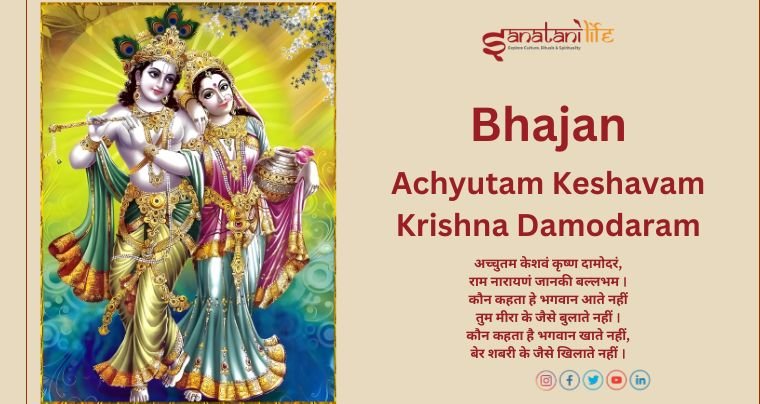Achyutam Keshavam Krishna Damodaram in Hindi:
अच्चुतम केशवं कृष्ण दामोदरं,
राम नारायणं जानकी बल्लभम ।
कौन कहता हे भगवान आते नहीं
तुम मीरा के जैसे बुलाते नहीं ।
कौन कहता है भगवान खाते नहीं,
बेर शबरी के जैसे खिलाते नहीं ।
कौन कहता है भगवान सोते नहीं,
माँ यशोदा के जैसे सुलाते नहीं ।
कौन कहता है भगवान नाचते नहीं,
गोपियों की तरह तुम नचाते नहीं ।
नाम जपते चलो काम करते चलो,
हर समय कृष्ण का ध्यान करते चलो ।
याद आएगी उनको कभी ना कभी,
कृष्ण दर्शन तो देंगे कभी ना कभी ।
Achyutam Keshavam Krishna Damodaram in English:
“Acchutam Keshavam Krishn Damodaram, Ram Narayanam Janaki Ballabham.
Kaun kahata hai Bhagwan aate nahin, tum Meera ke jaise bulate nahin.
Kaun kahata hai Bhagwan khate nahin, ber Shabari ke jaise khilate nahin.
Kaun kahata hai Bhagwan sote nahin, Maa Yashoda ke jaise sulate nahin.
Kaun kahata hai Bhagwan nachte nahin, gopiyo ki tarah tum nachate nahin.
Naam japte chalo kaam karte chalo, har samay Krishn ka dhyan karte chalo.
Yaad aayegi unko kabhi na kabhi, Krishn darshan to denge kabhi na kabhi.”
FAQs: “Acchutam Keshavam” Bhajan:
Q1: What is the central theme of this bhajan?
A1: The central theme of this bhajan is the omnipresence and responsiveness of God, emphasizing that God is always present and listens to devotees’ prayers.
Q2: What is the significance of Meera, Shabari, and Yashoda in this bhajan?
A2: Meera, Shabari, and Yashoda are cited as examples of devotees who experienced God’s presence and interaction:
-
Meera: symbolizes devotion and love
-
Shabari: represents selfless service
-
Yashoda: exemplifies motherly love
Q3: What is the message conveyed through this bhajan?
A3: The bhajan conveys:
-
God is always present and listening
-
Devotion and faith can lead to divine experiences
-
God responds to sincere prayers
Q4: What is the musical style of this bhajan?
A4: This bhajan is typically sung in traditional Indian classical or semi-classical styles, such as Raga Yaman or Kafi, with accompaniment by instruments like the harmonium, tanpura, or tabla.
Q5: How does this bhajan reflect Hindu philosophy?
A5: This bhajan reflects Hindu philosophy by emphasizing:
-
Bhakti (devotion) as a path to God-realization
-
Avatars (incarnations) of God (Krishna, Rama)
-
Personal relationship between God and devotee
-
Importance of faith and surrender
Q6: What role does this bhajan play in Hindu worship and rituals?
A6: This bhajan is often sung:
-
During puja (worship) ceremonies
-
In temples and spiritual gatherings
-
During festivals (Janmashtami, Ram Navami)
-
As a part of daily devotional practices





